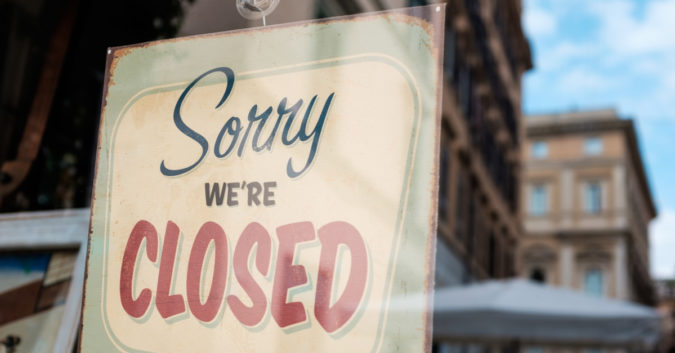The business model for insurance is highly profitable during the good times.
When disaster strikes, however, insurance companies suddenly find themselves on the hook for the protections they promised, some of these firms try to distance themselves from their costly responsibilities.
Because of the ongoing, worldwide coronavirus pandemic, businesses have been shut down, workers sent home, and many citizens are under orders to shelter-in-place. State and federal authorities are working as hard as they can to help the country return to normal life, but even the most hopeful projections suggest it will be months before that happens.
Moving forward, people who have paid insurance premiums to protect their livelihood against hard times may find themselves in a fierce debate about the limits of their coverage.
Insurers Under Pressure From Coronavirus — Will They Pass It on to Policyholders?
Restaurants, event-centers, and other such entities usually have insurance set up to compensate businesses during unforeseen closures. Business interruption coverage is just one of the many forms of insurance companies purchase in order to have some shelter from whatever disaster has forced them to cease operations.
Following the forced shutdown of “non-essential” businesses by states across the country, there has been a spike in claims for business interruption coverage. In some cases, insurers have already denied these claims, setting the stage for the first round of bad faith insurance lawsuits associated with the coronavirus.
One such complaint that has gained national attention is from a restaurant group outside Chicago that shuttered their businesses after a state order from the Illinois government. In fact, they allege that their insurer denied their claim for business interruption insurance within hours of receiving it, not after an adequate investigation as required by law.
Much will hinge on the specific language in each contract, but the extraordinary nature of the coronavirus outbreak puts unique pressures on both individuals and insurers. In 3 states so far, lawmakers have introduced bills to make sure insurance companies pay out for coronavirus.
Some companies, like Allstate, have taken a proactive role and given consumers money back on their car insurance policies. The idea is that people are staying home instead of driving, resulting in a downtick of auto claims. This behavior is good, but certainly not the norm.
The businesses and trade groups that have filed bad faith lawsuits thus far represent just one of the many problems faced by the insurance industry as a result of the crisis.
As individuals come forward with their own claims associated with the coronavirus, will insurance companies seek to deny legitimate claims?
While COVID-19 coverage litigation promises to raise a number of thorny questions in uncharted legal waters, those with insurance still have a right to their coverage.
No one should have to put up with bad faith tactics from insurance companies, regardless of the situation.
What Is Bad Faith Insurance?
When insurance companies try to avoid paying a legitimate claim, it’s known as bad faith. With car insurance, for example, most drivers pay their premiums for years before they need to file a claim. They assume that their insurance company will act on good faith, should an accident happen, and pay out the money they owe according to the contract.
Bad faith insurance laws vary state to state, but in any contract in the U.S., it is presumed the 2 parties will act in good faith and fair dealing. Just as an individual should not submit a false claim to their insurance provider, a provider should not deny the valid claim of a policyholder.
Insurers engage in bad faith tactics when they attempt to prevent a person from filing a legitimate claim or refuse to pay their fair share.
Such unlawful actions include:
- Refusal to provide fair value for a claim
- Unreasonable delays
- Deceptive practices, such as confusing or misleading policyholder about their coverage
- Failure to conduct a thorough investigation before denying a claim
- Arbitrary demands regarding proof of loss
- Asking for undue contributions
- Deliberate misinterpretation of records or policy language
- Abusive tactics, threats of litigation
When insurance companies use these types of bad faith actions to put pressure on a policyholder or deny their claim, they are breaking the law.
The problem is that it is not always easy for an individual to know when an insurance company is acting in bad faith. Many people don’t know the extent of their legal rights or what is in-bounds for the insurance company to demand.
Often, they are to navigate the complex insurance system at the same time they are dealing with a traumatic injury or diagnosis. These patients deserve respect and accommodation, not deceptive or abusive tactics designed to save the company money.
Yes, insurers are facing a once-in-a-lifetime event — but so are their policyholders. Backing out now is a crime.
In a time of crisis, insurers need to step up, not out of the way.
